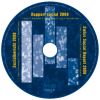Introduction
![]()
Goal and orientation of the Social Report 2008
The Swiss Social Report 2008 documents the current social situation and social change in Switzerland based on systematically collected data and indicators. What kinds of inequality shape Swiss society? How has the cultural face of Switzerland changed – for example, with regard to multilingualism? Is there social solidarity in Switzerland – for instance, in the form of voluntary work? To what extent has political life in Switzerland become polarised and politicised? What about the relation between environment and society – how has awareness for the environment and environmentally friendly behaviour changed in the Swiss population over the past few years?
The economic, social, cultural, political and ecological situation in Switzerland is compared with that in other selected countries: France, Germany, Great Britain, Spain, Sweden and the USA. In addition to the selected 75 indicators, the paper edition of the report contains a short comment for each indicator. Detailed analytical reviews on educational inequality, multilingualism, voluntary commitment, political polarisation, ecological awareness and environmental behaviour by specialists of the specific domain are included in the German and French paper editions.
The Swiss Social Report 2008 is the third in the series, the previous editions having been published in 2000 and 2004. In the current edition, the data and the diagrams have been completely revised, brought up-to-date and further indicators have been added. All data are presented graphically and are available in electronic form on the CD-ROM and online (both in html format and in Excel format). The Swiss Social Report 2008 is also published in German under the title Sozialbericht 2008 and in French as the Rapport social 2008.
International comparisonThe choice of countries in the international comparison is orientated, on the one hand, on their significance for Switzerland and their vicinity to it (in the sense of their linguistic and cultural relationship). On the other hand, international diversity and institutional variety is to be covered where possible by ‘typical’ cases. Based on the country typologies developed within comparative welfare state research, it is advisable to take into consideration not only the central European countries with the conservative welfare state type (e.g. Germany, France, Austria, Belgium), but also representatives of the liberal model (e.g. Great Britain, the USA), the comprehensive welfare state regimes influenced by social democracy in the Scandinavian countries (e.g. Sweden) and the very rudimentary welfare schemes in southern Europe (e.g. Spain). As the number of possible countries for comparison has to be limited for reasons of presentation and space, the following six countries were selected for the comparison: Germany, France, Great Britain, Sweden, Spain and the USA. In individual cases and where appropriate as to content, further countries were included. For example, for the indicators on language and foreign-language use, Belgium was also considered as it provides an interesting case for comparison because of its multilingualism.
Time framework
The Social Report 2008 covers the second half of the 20th century and the first years after the turn of the century, with current data up to 2007. From the economic viewpoint, this period includes the long boom in the fifties, sixties and early seventies, the two short recessions of 1975–1976 and 1982–1983, the economic high in the eighties, the long phase of recession and stagnation in the nineties (for Switzerland the longest since the Second World War) and the economic recovery from the end of the nineties.
Data bases used
Scientifically based social reporting, which is the aim of the Social Report, is dependent on a comprehensive data base which fulfils demanding criteria as regards quality. Of central importance here are continuous investigations and population surveys – only on this basis can reliable knowledge on social change be gained. Apart from repeated, representative, cross-sectional surveys, which are carried out at regular intervals, longitudinal studies are of particular interest, for instance in the form of household panel surveys. For an investigation that compares data over time and between countries, as is the intention in the Social Report 2008, international comparative studies are necessary in addition to the comparison over time. In the past few years – thanks to Switzerland’s participation in various international surveys – the situation regarding data has now considerably improved. A more complex, simultaneous comparison over time between countries on the basis of individual data can, however, only be realised in exceptional cases, or merely for the comparatively short time period from the late nineties onwards. The data used in the Social Report 2008 was based on the above-mentioned criteria, i.e. on the scientific quality of the data (quality of the survey and of the instruments used, documentation, representativity, etc.), the continuity and periodicity or regularity of the survey (long sequences), the actuality (data on the newest developments) and the international comparability (data for the selected countries). Various criteria for each indicator or theme had to be weighed against each other, in order to obtain optimum data quality, continuity, actuality and international comparability.
In particular, five groups of surveys and data bases were used (for details, see the notes in the indicator section and on the CD-ROM):
- Longitudinal and repeated cross-sectional surveys comparing countries on the level of individual data, especially: the European Social Survey (ESS; or the U.S. ‘Citizenship, Involvement, Democracy’ Survey, US-CID for the USA) and the International Social Survey Programme (ISSP);
- Time series comparing countries on the level of aggregate data, especially data from: the Organisation for Economic Co-operation and Development (OECD), Eurostat, the International Labour Office (ILO), the United Nations Economic Commission for Europe (UNECE);
- Swiss longitudinal studies and repeated cross-sectional data on the individual level, especially: Swiss Household Panel (SHP), Swiss Labour Force Survey (SLFS), the Federal Population Census, the Swiss Electoral Studies (Selects), the survey on Transitions from Education to Employment (TREE), the surveys for Measurement and Observation of Social Attitudes in Switzerland (MOSAiCH), the Survey on Income and Consumption of Households, the Employment Statistics (ES);
- Swiss time series on the level of aggregate data, especially data from: the State Secretariat for Economic Affairs (Seco), the Federal Office for the Environment (FOEN), the Federal Chancellery, the Swiss Federal Tax Administration;
- Swiss studies on specific topics (detailed reviews), especially the following: Linguistic Competence of the Adult Population in Switzerland (linguadult.ch), the Swiss Volunteering Monitor, the Swiss Survey on the Environment.


